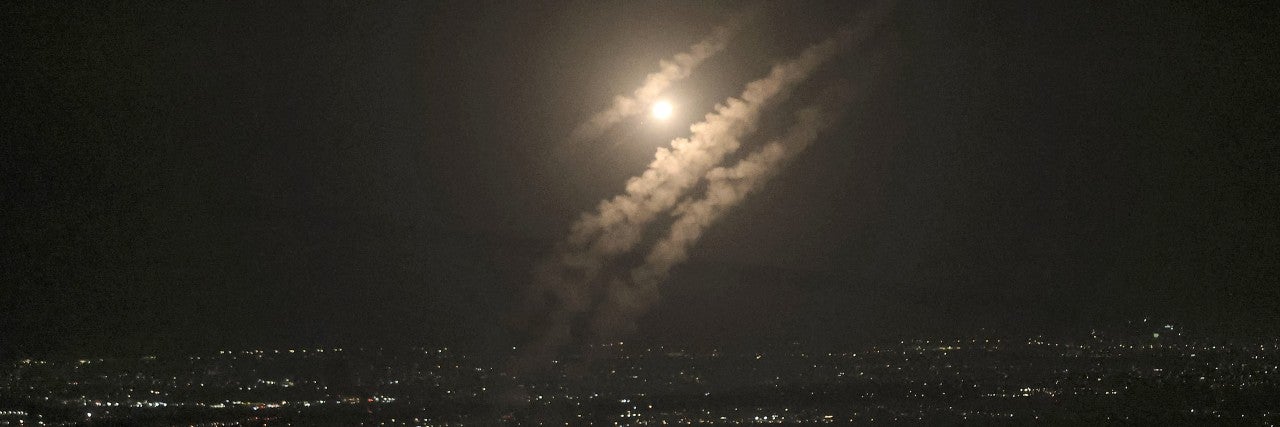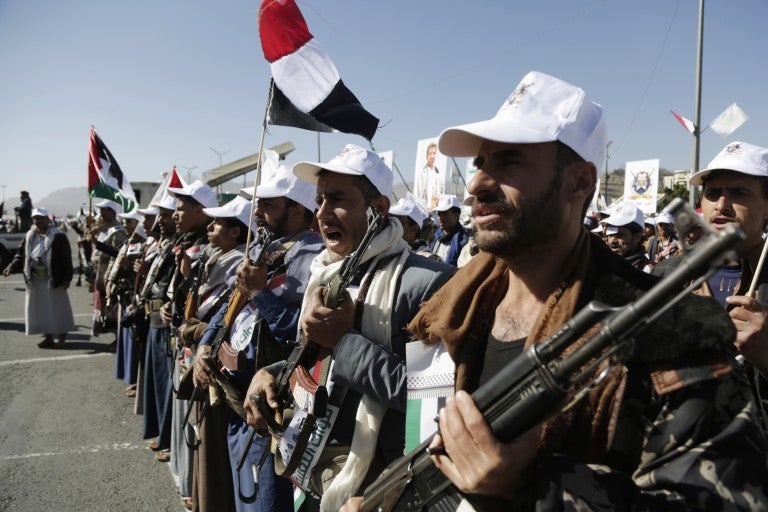October 1, 2024
As the sun set over Israel on October 1, millions of Israelis rushed to bomb shelters as the Iranian regime launched hundreds of ballistic missiles.
It marks the second direct Iranian strike on Israel since April, alongside ongoing assaults by its proxies, Hamas in Gaza and Hezbollah in Lebanon, since October 7.
Here's what we know about this latest Iranian attack and the coordinated defense efforts by Israel, supported by its neighbors and global allies, to protect the nation.
What is known about the Iranian attack?
According to the Israel Defense Forces (IDF), the aerial attack by Iran comprised more than 180 ballistic missiles, the largest single ballistic missile attack ever.
With assistance from the U.S. and other allies, Israel’s multi-layered air defense system, which consists of the short-range Iron Dome, medium-range David’s Sling, and long-range Arrow 3 air defense systems, intercepted most of the aerial attacks.
Most of the ballistic missiles, which have the capability of carrying a nuclear warhead, were shot down inside of Israel by the long-range Arrow 3 air defense system. The Iranian regime’s ballistic missiles can reach Israel in 12 minutes, unlike the drones or cruise missiles that were used in its April attack on Israel. Tragically, shrapnel from an intercepted ballistic missile killed a Palestinian man in the West Bank. No other casualties were reported.
Not all of the missiles were intercepted. Footage circulating on social media shows Iranian missile impacts in central Israel, including at a school.
“Iran made a ‘big mistake tonight,’ and it will pay for it,” said Prime Minister Benjamin Netanyahu after the Iranian missile attack on Israel, which he confirmed “failed” due to Israel’s advanced air defense system. Netanyahu warned that those who attack Israel, from Hamas leaders to Hezbollah commanders, “will understand” the country’s resolve, calling for global support against Tehran, and emphasizing, “Israel is on the move, and the axis of evil is retreating.”
IDF spokesman Daniel Hagari said Israel would respond appropriately to the attacks.
"We are on high alert both defensively and offensively. We will defend the citizens of Israel. This [missile] fire will have consequences. We have plans, and we will act in the time and place that we choose," he said.
Shortly before missile strikes began on Israel, two terrorists affiliated with Hamas from the West Bank town of Hebron, armed with an assault rifle and a knife, launched an attack in Jaffa, a Tel Aviv suburb. They shot and stabbed civilians on the city's light rail and continued their assault on Jerusalem Street. While no direct connection to the missile strikes has been established, the attacks occurred in close proximity.
Why did Iran attack Israel?
Bottom line: Iran’s end game is to eliminate the Jewish state. The Iranian regime openly calls for the annihilation of Israel. This attack is simply the latest in a decades-long genocidal campaign against Israel and the Jewish people. The regime’s proxies have also targeted American military installations in the Middle East; in January, three U.S. military personnel were killed in a drone attack in Jordan.
Israel has faced indirect Iranian attacks for decades through its terror proxies such as Hezbollah in Lebanon, Hamas and Palestinian Islamic Jihad from Gaza and the West Bank, and more recently, the Houthis in Yemen.
In April, Iran conducted its first-ever direct attack on Israel, launching some 300 missiles and drones at the Jewish state, the vast majority of which were shot down by Israel and its allies. It said that this attack was in retaliation for an April 1 strike that killed Mohammad Reza Zahedi, a top commander in Iran’s Islamic Revolutionary Guard Corp (IRGC) in Syria.
In a statement today, Iran said that the attack on Israel was in retaliation for Israel’s assassination of Hezbollah terror chief Hassan Nasrallah in September, Hamas’s leader Ismail Haniyeh in July, and other key figures in Iran’s terror network.
How is the international community responding?
U.S. President Joe Biden authorized the military to aid Israel's defense against Iranian attacks and to "shoot down missiles targeting Israel."
U.S. National Security Advisor Jake Sullivan stated that Iran's missile attack on Israel "appears to have been defeated and ineffective" and warned of "severe consequences" for the strike. Sullivan highlighted that nearly 200 Iranian missiles were intercepted by U.S. and Israeli defense units, adding that despite the escalation, no casualties were reported in Israel, though a Palestinian man was killed in the West Bank..
In remarks about the attack, U.S. Secretary of State Antony J. Blinken said that “the entire world should condemn” Iran’s attack.
Several world leaders and allies of Israel issued statements strongly condemning the Iranian attack and offering support for Israel, including the U.K., Germany, Austria, the Netherlands, Czechia, Romania, and many others.
AJC CEO Ted Deutch took to Twitter to express his support for Israel’s right to defend itself and called on the Jewish people to do the same: “Tonight, Iran has declared war on Israel by launching hundreds of ballistic missiles aimed at Israel’s 10 million people,” said Deutch. “Israel will strike back hard. As it defends its people, Israel is also defending our values. Israel will win, and the world will be better for it. Stand with Israel now, more than ever. Am Yisrael Chai.”


